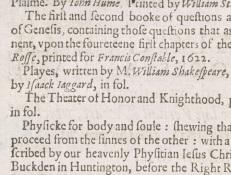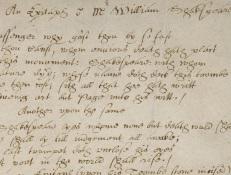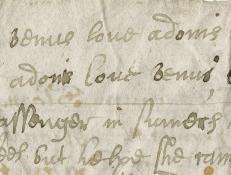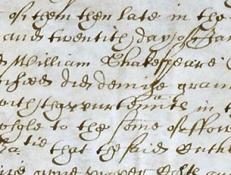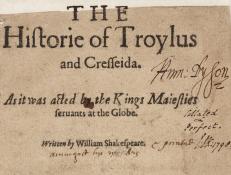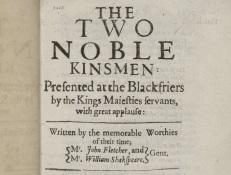To view a sortable list, please visit the Resource
All Documents
Autumn 1622
The principal book fair in Western Europe was held biannually in Frankfurt, Germany. While most books offered at the fair were in Latin, by 1618-1619 booksellers advertised books in English in printed catalogs.
1623
Three epitaphs to Shakespeare are copied onto the last leaf of this First Folio. The first is from Shakespeare’s monument in Holy Trinity Church.
circa 1623
In 1623, the antiquarian Sir Edward Dering turned the two parts of Henry IV into a single play, cutting 3000 lines from both. Dering’s adaptation is the earliest known manuscript copy, and first documented amateur performance of, a Shakespeare play (or rather, parts of two plays).
November 8, 1623
The First Folio, which represents the first printed collection of 16 of Shakespeare’s plays, was entered into Liber D of the Stationers' Company on November 8, 1623.
Spring 1624
The principal book fair in Western Europe was held biannually in Frankfurt, Germany. While most books offered at the fair were in Latin, by 1618-1619 booksellers advertised books in English in printed catalogs.
ca. 1630s
SHAKESPEARE DOCUMENTED IS STILL GROWING! Descriptive content and transcriptions will continue to be added, updated and expanded. Check back for regular updates!
1632
The lawsuit shown here, Burbage et al. v. Brend, is of greatest importance in allowing scholars to reconstruct the building of the 1599 Globe playhouse and its 1614 post-fire replacement in considerable financial detail.
ca. 1623- 1633
Humphrey Dyson (1582-1633) was probably the first owner of this copy of the first edition of Troilus and Cressida (1609), now in the Huntington Library. Dyson signed his name on the title page, as he did with many other volumes in his extensive library.
1634
SHAKESPEARE DOCUMENTED IS STILL GROWING! Descriptive content and transcriptions will continue to be added, updated and expanded. Check back for regular updates!
April 8, 1634
The Two Noble Kinsmen was entered into Liber D of the Stationer’s Company on April 8, 1634.

